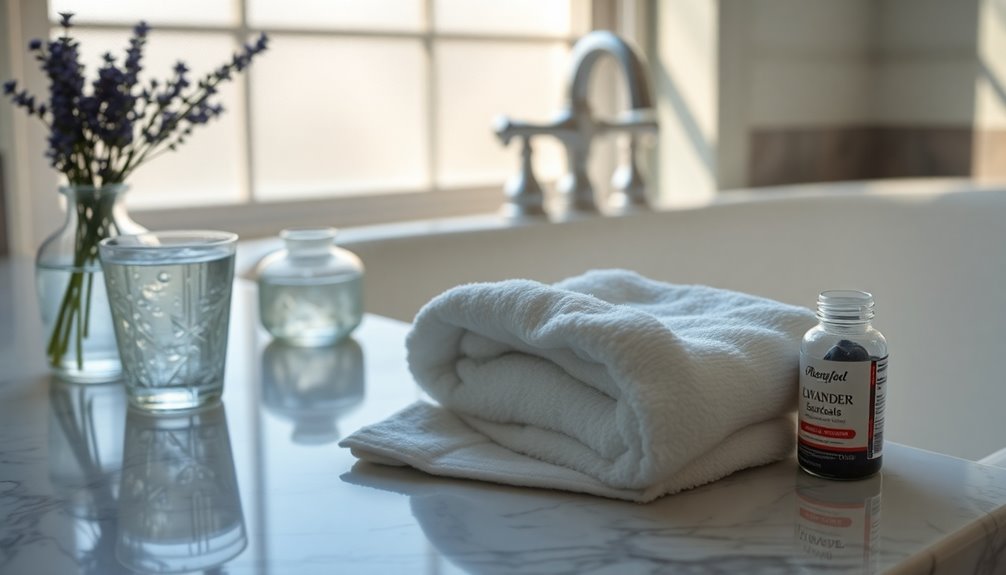You can technically have sex if you have a UTI, but it's not recommended. It can increase pain and discomfort and might worsen your infection. Penetrative sex can irritate the urethra and push bacteria deeper, raising the risk of complications. Instead of intercourse, consider non-penetrative activities to maintain intimacy without aggravating your symptoms. If you choose to engage in any sexual activity, make sure to urinate before and after to help flush out bacteria. Staying informed about your body and UTI can help you make the right choices moving forward. Want to learn more about managing UTIs?
Key Takeaways
- Engaging in penetrative sex during a UTI may worsen symptoms and increase discomfort.
- It's advisable to avoid sex until symptoms subside and treatment is complete.
- Non-penetrative sexual activities can maintain intimacy without increasing irritation.
- Communicate openly with your partner about your UTI and any discomfort.
- Always urinate before and after sexual activity to help flush out bacteria.
Understanding UTIs

Urinary Tract Infections (UTIs) are common yet often misunderstood, primarily caused by bacteria like Escherichia coli. These infections can enter your urinary tract from the gastrointestinal tract or feces.
Women face a higher risk due to shorter urethras, allowing easier access for bacteria. Sexual activity can introduce new bacteria, potentially worsening the infection, so being aware of risk factors is essential.
Symptoms often include pelvic discomfort and a burning sensation during urination, which can disrupt daily life.
To prevent UTIs, maintain good hygiene practices, stay hydrated, and consider your contraceptive methods.
If you do experience a UTI, timely treatment is necessary to alleviate symptoms and prevent complications. Understanding these factors can help you manage and reduce your risk of UTIs effectively.
Symptoms to Consider

What signs should you look for if you suspect a UTI? Common symptoms include a burning sensation during urination, frequent urination, and an urgent need to go.
You might also notice pelvic discomfort or strong-smelling, cloudy urine. If you experience pain during sexual activity, it could be exacerbated by these UTI symptoms, leading to increased discomfort.
It's essential to communicate any discomfort with your partner, as engaging in sexual activity may further irritate your urinary tract and complicate recovery.
Additionally, signs like blood in your urine, severe back or abdominal pain, and chills could indicate a more serious infection, requiring immediate medical attention.
Pay attention to these symptoms to prioritize your health.
Risks of Sexual Activity

Engaging in sexual activity while you have a UTI can lead to increased pain and discomfort, making the experience far from enjoyable.
There's also a risk of reinfection, as the bacteria causing your UTI could be transferred during intercourse.
It's essential to take into account these factors before deciding to be intimate, as they can complicate your recovery.
Increased Pain and Discomfort
While you might feel pressure to maintain intimacy during a UTI, having sex can greatly heighten your pain and discomfort. Engaging in penetration can irritate your sensitive urethra and bladder, worsening the burning sensation you already experience. This can make sex painful and may lead to a temporary loss of interest in intimacy.
Additionally, thrusting and friction can push bacteria deeper into your urinary tract, increasing the risk of complications like kidney infections. It's crucial to communicate openly with your partner about any discomfort.
Instead of traditional sex, consider exploring alternative intimacy options that don't involve penetration, allowing you to maintain your connection without amplifying your pain. Prioritize your comfort and health during this time.
Risk of Reinfection
Sexual activity during a UTI can considerably heighten the risk of reinfection. Engaging in sexual activity can introduce more bacteria into your urinary tract, worsening UTI symptoms and complicating your recovery. The act of penetration can push bacteria deeper, potentially leading to kidney infections. Pain during intercourse might discourage you from wanting to engage with your sexual partners, making the experience less enjoyable. It is crucial to wait until your symptoms resolve and you've completed the course of antibiotics to minimize the risk of reinfection.
| Risk Factors | Consequences | Recommendations |
|---|---|---|
| Sexual activity | Increased bacteria transfer | Wait until symptoms resolve |
| Pain during intercourse | Loss of interest in sex | Complete course of antibiotics |
| UTI symptoms | More severe complications | Consult a healthcare provider |
Bacterial Transfer Concerns
When dealing with a UTI, it's crucial to recognize that any sexual activity can introduce additional bacteria into your urethra, worsening your symptoms.
Engaging in sexual intercourse, especially vaginal intercourse, may push existing bacteria deeper into your urinary tract, increasing the risk of developing complications like kidney infections. The act of penetration can irritate sensitive tissues, exacerbating symptoms and causing more pain.
Although UTIs aren't sexually transmitted infections, bacteria transfer can occur between partners if hygiene isn't maintained. Infections can recur post-sex due to the introduction of new bacteria, emphasizing the importance of following medical advice and avoiding sexual activity until the UTI has fully resolved.
Prioritize your health and consider waiting until you're symptom-free.
Recommendations for Safe Practices

Avoiding penetrative sex is a key recommendation if you're experiencing a UTI, as it can exacerbate pain and discomfort. Engaging in sexual activity during this time can introduce more bacteria into your urethra, worsening the infection or leading to reinfection.
Instead, consider non-penetrative forms of intimacy, like manual stimulation or kissing, to maintain your connection without aggravating UTI symptoms. It's also vital to urinate before and after any sexual activity to help flush out bacteria and reduce irritation.
Open communication with your partner about your discomfort is essential, and seeking medical advice on when to safely resume sexual activity can help guarantee your health and well-being during this time.
Prioritize safe practices for a smoother recovery.
Treatment and Recovery

When you're dealing with a UTI, antibiotic treatment usually lasts between 3 to 14 days, depending on the infection's complexity.
Staying hydrated is essential during your recovery, as it helps flush out the bacteria.
Antibiotic Treatment Duration
Antibiotic treatment duration for urinary tract infections (UTIs) varies based on the infection's complexity, so knowing the right course is essential for effective recovery.
For uncomplicated UTIs, treatment typically lasts between 3 to 7 days, while complicated UTIs may require 10 to 14 days.
It's important to complete the entire course of prescribed antibiotics, even if you feel better, to avoid antibiotic resistance.
During your UTI treatment, monitor symptoms closely, and if you notice any new or persistent issues, consult your healthcare provider for possible medical intervention.
Follow-up appointments might be necessary, especially for recurrent infections, to confirm that the infection has fully resolved.
Staying on top of your treatment guarantees a smoother path to recovery.
Importance of Hydration
Staying well-hydrated is essential for your recovery from a urinary tract infection (UTI), as it helps flush out bacteria from your urinary tract.
Drinking water increases fluid intake, diluting urine and potentially alleviating the discomfort associated with urination. This promotes urination, which is vital for expelling bacteria and reducing the risk of further infection.
To support your overall urinary health, make sure to avoid dehydrating substances like caffeine and alcohol, as they can irritate your bladder and worsen UTI symptoms.
Maintaining proper hydration not only aids in recovery but also helps prevent recurrent UTIs by creating a healthy urinary system environment.
When to Seek Medical Advice

Recognizing the signs that warrant medical advice is essential for managing a urinary tract infection (UTI) effectively. If you experience UTI symptoms like bleeding during urination, severe back pain, or unusual discharge, you should seek medical advice promptly. These could indicate complications from a UTI that require immediate medical attention.
Additionally, consult your healthcare provider if your symptoms persist after completing a course of antibiotics, as this may point to reinfection or antibiotic resistance. If you develop fever, chills, nausea, or vomiting, don't wait—seek immediate medical attention, as these symptoms may signal a more serious kidney infection. Regular check-ups are vital for those with recurrent UTIs to maintain urinary health and prevent future infections.
Regular check-ups are vital for those with recurrent UTIs to maintain urinary health and prevent future infections.
Prevention Strategies

After addressing when to seek medical advice for UTIs, it's important to focus on prevention strategies that can help you reduce the risk of future infections.
Maintaining good hygiene practices, like wiping from front to back and washing your genital areas before and after intercourse, keeps bacteria at bay. Urinating after sex can flush out any bacteria that may have entered your urinary tract, lowering UTI risk.
Staying well-hydrated encourages frequent urination, which helps eliminate bacteria. Additionally, avoid spermicidal condoms and choose non-irritating lubricants to minimize irritation.
Engaging in non-penetrative sexual activities can maintain intimacy without increasing the risk of UTIs or introducing new bacteria.
Frequently Asked Questions
What Should You Not Do With a UTI?
When you have a UTI, avoid engaging in penetrative sexual activities, as this can increase pain and irritation.
Don't use sex toys or fingers without ensuring they're clean, since bacteria can worsen your infection.
Refrain from switching between vaginal and anal intercourse without proper hygiene, as this spreads bacteria.
It's best to wait until you're symptom-free and have completed your antibiotic treatment to prevent reinfection and further discomfort.
Communicate openly with your partner about your situation.
Can My Boyfriend Go Down on Me With a UTI?
If you have a UTI, you might want to reconsider letting your boyfriend go down on you. It could make your symptoms worse and lead to increased irritation.
Plus, there's a risk of transferring bacteria, especially if you don't maintain proper hygiene afterward.
It's essential to communicate your discomfort and consider waiting until you're symptom-free to avoid complications and guarantee a more enjoyable experience for both of you.
Can My UTI Get Worse After Sex?
Isn't it ironic how a little fun could lead to more pain?
Yes, your UTI can get worse after sex. The friction and pressure might push bacteria deeper into your urinary tract, making symptoms more intense.
Engaging in sexual activity can irritate sensitive tissues, prolonging your discomfort and complicating recovery.
It's best to wait until you're symptom-free and have completed your antibiotics to avoid turning your intimate moments into a painful experience.
How Long Does It Take for a UTI to Clear Up?
A typical uncomplicated UTI usually clears up within 3 to 7 days after starting antibiotics, but you might notice some symptom improvement within 24 to 48 hours.
It's essential that you complete the entire course of antibiotics, even if you feel better.
If your UTI is complicated, it could take up to 14 days for a full recovery.
Always check in with your healthcare provider if symptoms persist after treatment.
Conclusion
In summary, while it's tempting to push through a UTI like a runner ignoring a sprained ankle, it's essential to listen to your body. Engaging in sex during a UTI can worsen your discomfort and prolong recovery. Just like you wouldn't run a marathon with an injury, prioritize your health first. Take the time to heal, and when you're back to feeling yourself, you can enjoy intimacy without worry. Remember, your well-being comes first!










